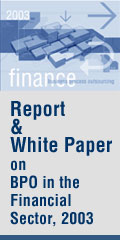|


|
Moody's affirms existing ratings of ICICI Bank
November 04, 2008: Moody's Investors Service affirmed all existing ratings of ICICI Bank Ltd with their stable outlook. Moody's has lowered the bank's baseline credit assessment (BCA) from Baa1 to Baa2, which is the highest BCA level assigned to Indian banks, but under Moody's methodology, the bank's other assigned ratings remain unchanged, as follows:
- Bank financial strength rating (BFSR) of C-
- Global local currency deposit ratings of A2/P-1
- Foreign currency deposit ratings of Ba2/NP (constrained by the foreign currency deposit ceiling)
- Foreign currency senior debt rating of Baa2 (constrained by the foreign currency debt ceiling)
- Foreign currency subordinated (Lower Tier 2) debt rating of Baa2
- Foreign currency junior subordinated (Upper Tier 2) debt rating of Baa2
- Foreign currency perpetual non-cumulative (Hybrid Tier 1) debt rating of Baa2
All ratings carry a stable outlook. The deposit and debt ratings, which continue to factor in imputed systemic support as earlier, remain unchanged, while the C- BFSR remains unchanged but has weakened within its current category.
"Moody's view that ICICI Bank's BCA should be aligned to the same level as rated peers, takes into account the challenges faced by it in maintaining its strong earnings profile, its good asset quality as well as its capacity to refinance its foreign currency funding needs in the currently difficult global markets," said Nondas Nicolaides, lead analyst at Moody's for the bank.
Results for the first half ending September 2008 indicate that the bank's net income has been negatively affected at both bank and group level, due to the widening of spreads on its international investments and due to high interest rates locally. Net profits for the period declined year-on-year by around 2%, while group net profits declined year-on-year by 22.7%, although group performance is largely affected by the losses incurred by its life insurance company.
A 43.4% increase in loan loss provisions also impacted the bank's half-year performance, despite a 56% year-on-year increase in its core operating income driven by a 31.6% year-on-year increase in fee income and better interest margins. Moody's believes that the toughened operating environment is weakening ICICI Bank's earnings profile. This bottom-line performance for this period also compares relatively unfavourably with that of other C- rated Indian banks with a Baa2 BCA. With this rating action, ICICI Bank's standalone financial position is now aligned with that of other C- rated Indian peers, Moody's added.
Asset quality has also been on an adverse trend for ICICI Bank, with non-performing loans increasing to 4.2% of gross loans in September 2008 compared to 2.8% one year previously, as the absolute volume of such loans increased year-on-year by 60.2%. At the same time, the bank is consciously slowing down its loan growth and, more specifically, its retail credits, where it is in the process of consolidating its position. "Going forward, the bank like other Indian banks is likely to face increased asset quality challenges as the global economic slowdown is likely to have a knock-on effect on the Indian economy as well," Mr Nicolaides cautioned.
ICICI Bank's liquidity position remains comfortable, in Moody's view, despite a 2.1% year-on-year decline in its total deposits as it continues to reduce its wholesale high-cost deposit base and increase its proportion of current accounts and savings accounts, which now constitute 30% of total deposits compared to 25% a year ago. This has helped to improve the bank's still relatively low net interest margins.
Moody's also notes that the bank has a certain level of foreign currency debt maturities in the next six months, and will closely monitor its refinancing given the currently volatile conditions. However, the rating agency notes that the bank has not had to access the international capital markets for the last one year and recognises that the bank was able to arrange a bilateral loan facility as late as September 2008, which may suggest that the bank would be able to comfortably meet its forthcoming foreign currency obligations. Assistance from the central bank in obtaining foreign currency funds is also a possibility not only for ICICI Bank but also for other Indian banks and corporates with foreign currency borrowings.
Going forward, the bank should be able to further improve its funding profile through retail deposits as its branch network in India has now reached 1,400 and given the focus placed in mobilising foreign currency deposits through its robust internet platforms in both its UK and Canadian subsidiaries. Moreover, the bank continues to be strongly capitalised with a Tier 1 ratio of 11.03% as per Basel II norms, providing a significant cushion for future growth as well as for absorbing any possible unexpected losses.
CLICK FOR SPECIAL SECTION ON GLOBAL FINANCIAL CRISIS
India's Ratings Maintained by S&P on Growth Outlook
Global real credit growth to halve this year
Government measures should stabilize global banking markets
Global banking industry to see more restructuring & consolidation
Indian Banking sector challenged by domestic, not global, factors
Subprime Crisis: A Special
CLICK FOR MORE FEATURES & STORIES

|
|
|



